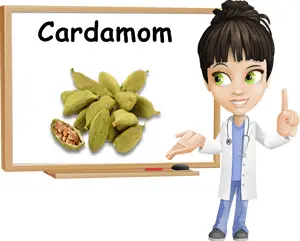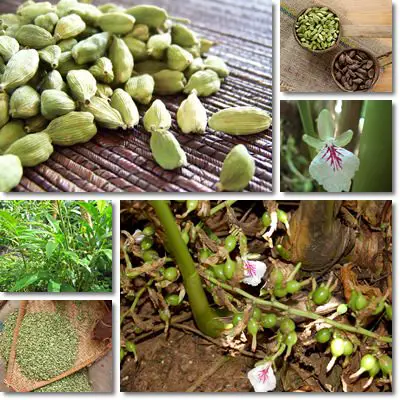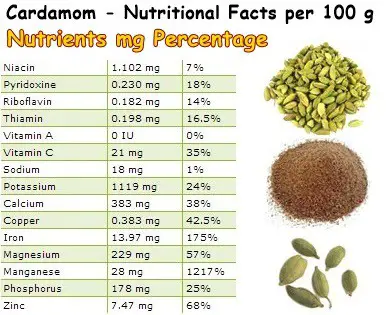The small green-gray pods packed with tiny black seeds known as cardamom (Zingiberaceae family) date back to biblical times and have since been known for their unique and strong flavor as well as outstanding medicinal properties.
Cardamom seeds and pods are an amazing source of manganese, a powerful antioxidant-mineral which prevents free radical damage to cells, promotes fast wound healing, supports thyroid activity and maintains a healthy reproductive system.
Rich in zinc, the spice is greatly recommended for a strong immune response and healthy immune system organs. Moreover, cardamom is an excellent source of potassium and magnesium, two genuinely heart-friendly minerals with impressive blood pressure lowering properties. The good amounts of copper, iron and phosphorus offer antioxidant protection to cells and DNA, prevent premature hair graying and iris discoloration, improve energy levels and other symptoms of anemia and contribute to bone strength.
Highly valued as both a spice and an herb, cardamom is one of the priciest of its kind, ranking third on the most expensive spice list.

What does cardamom look like?
The cardamom plant look a bit like the ginger plant, but has a considerably wilder appearance: bright green stems which shoot up like secular trees in a rain forest, while the 1-2 cm long pods linger on the ground, by the base of the plant, like a sort of savage vegetation. Green cardamom pods are small, gray-green and look a bit like discolored corn leaves (on a much smaller scale, of course). Black cardamom pods are brown in color. Each pod is stuffed with tiny dark-brown or black seeds which are usually ground (dried or smoked) and sold as a (quite expensive) culinary spice.
What is the flavor of cardamom?
Well, cardamom has a strong scent and an intense, quite specific flavor, unlike other spices. There are two major varieties:
- Green cardamom or true cardamom (Elettaria cardamomum)
- Black (or brown) cardamom (Amomum costatum, Amomum subulatum)
What does cardamom taste and smell like?
Both varieties have a strong aroma, black cardamom being even stronger (and its pods bigger) than green cardamom, so it might be best to not overuse it when cooking. Overall, cardamom has a somewhat spicy, herbal-resinous flavor, with a slight citrus hint and a minty, eucalyptus aftertaste. It is excellent for bread, sweet rolls, meat and rice-based dishes and pairs great with cinnamon. Cardamom tea is another great way you can enjoy this fragrant spice and you may even try to add a pinch to your coffee for more flavor.

What are the benefits of cardamom?
Now let’s see why cardamom is so healthy. These are its top 6 nutrition facts and health benefits:
Rich in essential oils
As is the case with all spices, the more fragrant the flavor, the richer its essential oil content. Cardamom makes no exception: its strong flavor is a result of a combination of essential oils, namely: pinene, sabinene, myrcene, phellandrene, limonene, 8-cineol, terpinene, p-cymene, terpinolene, terpinen-4-ol, terpineol, terpineol acetate, linalool, linalyl acetate, citronellol, nerol, geraniol, methyl eugenol and trans-nerolidol.
Pinene, for example, is also found in pine tree resin an pine nuts, hence the resinous flavor of cardamom. Myrcene, also found in the hemp plant, is an analgesic with impressive sedative effects. Phellandrene may be responsible for the minty, citrus fragrance identified in cardamom.
Excellent antioxidant content
Only 100 g of cardamom provides 1217% of the RDA of manganese, an incredibly powerful antioxidant-mineral. Manganese is a co-factor for an enzyme called superoxide dismutase which basically hunts down and destroys free radicals, harmful molecules that cause inflammation and disrupt normal cell activity, causing cells to mutate and turn cancerous.
Having enough vitamins and minerals in your diet at all times is imperative because our body needs nutrients not only to support basic, life-sustaining cell processes, but also to repair damage that occurs as a result of poor diet, stress, disease and an overall deficient lifestyle. By giving your body vitamins, minerals and antioxidants, you give it the tools to survive, repair itself and recover from disease.
The high content of manganese in cardamom promotes fast wound healing, supports thyroid activity and reproductive system health and boosts fertility. Due to its beneficial effects on the thyroid gland, manganese supports the production of thyroxine, a hormone involved in bone and nerve development and good metabolism.

Promotes cardiovascular health
Cardamom is a generous source of potassium (24% of the RDA) and magnesium (57%). Potassium efficiently regulates body fluids and blood pressure. Getting enough of it from your diet will make you feel fresh and energized during hot summer days when we lose great amounts of electrolytes due to dehydration. You can also ask you doctor or a local pharmacist for some potassium supplements or mineral salts which also contain potassium if you are dealing with severe diarrhea and vomiting. This should help you recover faster and replenish lost fluids and electrolytes as a result of dehydration.
Magnesium ensures calcium deposits in bones and not on artery walls where it could build into plaques. If these plaques break, they may block blood flow in blood vessels and cause potentially life-threatening cardiovascular events such as heart attack or stroke.
Anti-aging properties
Cardamom is rich in antioxidants, notably manganese, copper and vitamin C. Antioxidants delay aging signs that come as a result of oxidative stress (from free radicals) and trigger tissue repair processes that preserve skin (blood vessels and organ) integrity. Copper also prevents premature hair graying and iris discoloration.
Excellent immune booster
Having a high content of zinc (68%), cardamom supports the immune system in its fight against viruses and bacteria by strengthening it and reducing recovery time. Zinc is one of the best nutrients for a strong immune system.
Traditional uses
Traditional medical practices recommend cardamom for a variety of ailments, especially digestive problems. It is said that cardamom consumption relieves flatulence (gas) and constipation. Cardamom boasts an incredible dietary fiber content (28 g) so, although you only consume it in small amounts, it adds to your daily needs and helps regulate intestinal transit. It is also said to calm stomach cramps (natural antispasmodic) and is regarded as an excellent expectorant, diuretic, tonic and antiseptic.
Conclusion
Overall, cardamom appears to be a deserving spice, that is, deserving to be in your kitchen. Not only does it have a strong flavor, pleasant flavor, but it is also incredibly nutritious and health friendly. Its high vitamin and mineral content gives cardamom excellent antioxidant, anti-inflammatory and antibacterial properties and accounts for its immune-boosting and anti-aging effects as well as cardiovascular benefits and fertility-promoting action.
